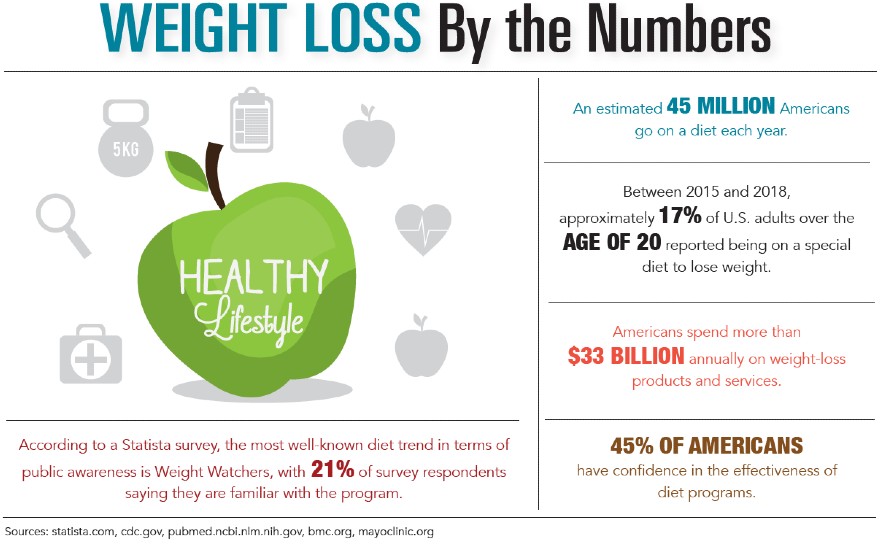From 2013 to 2016, nearly half of all adults in the United States tried to lose weight within the previous 12 months, according to findings from the July 2018 National Health and Nutrition Examination Survey.
Many people immerse themselves in the latest fad diets and slim down for a time, only to see their weight fluctuate, a pattern of weight loss and regain known as “yo-yo dieting.”
There are a range of medical weight loss programs and options available that maybe don’t fit the traditional mold but are geared toward developing lifelong healthy habits that help individuals lose weight safely and manage their weight.
Summerville Medical Center Splash-n-Dash Bariatric Triathlon
When losing weight, motivation and setting realistic goals plays a significant factor. Recognizing this, Neil McDevitt, M.D., FACS, director of bariatric services at Summerville Medical Center, conceived of the idea for the inaugural Splash-n-Dash Bariatric Triathlon, held on Oct. 17.
“Sometimes losing weight is not the crux of it,” stated Dr. McDevitt, explaining that weight loss is also about finding some sort of purpose and discovering that “it” factor.
What exactly that “it” is may differ by the individual, he said. For some it might entail taking up Orange Theory; for others it could be learning kickboxing.
That was part of his thought process behind devising the triathlon, which consisted only of SMC’s bariatric patients and was designed to be noncompetitive.
“We wanted them to feel comfortable,” noted Dr. McDevitt. “Something that would be intimidating yet doable.”
The triathlon featured a biking and swimming component, along with the option to run or walk. Patients could register as individuals or join a team. The teams would then serve as their own support network.
Twenty people participated in the Splash-n-Dash event, and feedback was positive, with patients’ family members expressing interest in joining in alongside their relatives next year.
SMC bariatric program patient Dennis Wells, who participated in the triathlon, started his weight loss journey in November 2019 when he saw an ad for a seminar with Dr. McDevitt and liked his approach.
“His process is not necessarily a diet – it’s a way to live with more than just surgery,” said Wells.
Patients receive instructive guides on portions and eating healthier. Before he even had bariatric surgery, Wells lost 85 pounds.
Once Wells began shedding weight, he became more active and started exercising more, increasing from 3,000 to 10,000 steps a day.
“It’s changing your lifestyle and understanding really what makes a difference,” he remarked.
In June 2020, Wells underwent bariatric surgery. When discussions later came up about a bariatric triathlon, he recalled thinking, “I didn’t even know if I could do it.”
Wells was an athlete in high school, but he went on to work a high-stress job and essentially stopped exercising for nearly five decades. At his heaviest, he weighed 368 pounds, but is now down to 222 pounds.
Wells trained for the triathlon, maintaining his walking routine. Then he started swimming and, finally, biking. “That (biking) was the hardest thing for me,” he proclaimed. “It definitely wasn’t my strength.”
Wells persevered and completed the triathlon, even finishing second in his division.
Dr. McDevitt hopes patients use this experience as a springboard to compete in other events such as 5Ks and recognize their potential.
“The most important thing is that they are no longer intimidated. By doing these things our patients realize they are capable,” he commented.
Forum Health: Hormone balance and GDRx
Connie Casebolt, M.D., MPH, with Forum Health in Greenville, said that when the office evaluates patient weight, they check to see if an individual’s hormone levels are too low, which can affect weight gain. They ensure people are at their optimized hormone levels.
“All people lose hormones as they age,” explained Dr. Casebolt, who is board-certified in family medicine and has a master’s in public health with an emphasis on nutrition.
She described hormones as a “huge piece” of the overall weight loss and long-term weight management puzzle. Toxins are another factor.
“There is an association between weight gain and an accumulation of toxins,” stated Dr. Casebolt, citing exposure to a moldy environment as one example.
Sometimes people can suffer from a condition known as dysbiosis, a gut imbalance where harmful bacteria accumulate in the gut, which can lead to inflammatory diseases and chronic illness.
Forum Health offers a five-week program called GDRx (Gut-Detox Prescription), a medically-supervised program overseen by a professional, qualified health coach, which helps a person detoxify. Dr. Casebolt said certain foods can cause inflammation in one person and not another. With GDRx, patients are placed on an elimination diet in which they determine what foods are adversely affecting them and eliminate them. The idea is to assist people in developing a more permanent healthy eating pattern.
She noted that when people initially shed pounds on a diet, they often lose water weight that is ultimately gained back. The goal is not to dramatically lose weight but rather to take a measured weight-loss approach.
Maintaining hormone balance, combined with a change of habit that addresses what Dr. Casebolt dubbed “the big three addictive foods” that keep you eating – those containing sugar, fat and salt – are key to avoiding weight regain.
“You can’t just go on a diet,” she said. “You have to adopt a permanent lifestyle.”
Carolina Holistic Medicine
Carolina Holistic Medicine in Mount Pleasant has developed and updated its own weight-loss program, according to Yusuf Saleeby, M.D.
“It is not a cookie-cutter program or anything copied from elsewhere but adheres to the principles of functional medicine, avoiding synthetic stimulant drugs,” Dr. Saleeby told HealthLinks via email.
He added that it “leans on more natural remedies, including select cutting-edge hormone therapy such as can be seen in the use of peptides. Peptides have been used in Europe and the former USSR for over 30 years with amazing properties, safety profiles and effectiveness. Most are oral forms, but some are injectable.”
Nurses coordinate and manage the process. The first step requires an initial consultation with a provider to customize the weight-management program, according to Dr. Saleeby.
They offer teaching and guidance for customized dietary plans tailored to the individual, and health coaches are available through Zoom group meetings, which can be arranged for program participants.
Follow-up includes weigh-in days and possibly subcutaneous or intramuscular injections of some agents. Family nurse practitioners and physician assistants follow up further, and patients are counseled by certified and preferred health coaches.
Dr. Saleeby’s office provides several customized and personalized precision medicine options, from basic to quite advanced. This includes cardio-pulmonary stress testing and VO2 max testing – a fitness test performed on a bike or treadmill – to analyze fitness levels and address exercise prescriptions.
Doctor for Life: A holistic weight loss approach
Among treating a variety of illnesses, the team at Doctor for Life in Greenville also finds that assisting patients with their weight concerns is part of helping them become healthy individuals. Weight is not only a symptom of poor lifestyle habits but also a disease that has an impact on long-term health.
Dr. Cheryl Sarmiento, founder and owner at Doctor for Life, explained that they take a comprehensive approach to help their patients make life-long weight management changes in order to prevent illness and disease later in life.
Doctor for Life provides a team of professionals to help patients on their weight-loss journey, including a medical doctor who is an obesity specialist, a dietitian, an executive chef, a massage therapist, a behavioral health coach and a personal trainer.
“We want permanent weight loss, and that is why we tailor our programs to the individual, which will impact their whole health,” explained Dr. Sarmiento.
The team first assesses the patient’s caloric needs and exercise capability before prescribing the appropriate treatments. The behavioral side of the weight-loss program helps patients with motivation and combating negative thoughts.
“We are a patient-centered, doctor-guided and team-supported weight-management program,” she said. “Our approach is realistic, and it works. Many doctors will just treat patients over and over, and the patients will just keep getting sick. We want to educate patients on preventing illness. We give them the tools they need, rather than just advice, plus we hold them accountable.”
They also work with patients on exercise routines and behavior modification counseling. Get Well, Stay Well is a 12-month program designed for patients looking to lose weight and maintain a healthy lifestyle.
The Targeted Therapeutics program is a high-intensity, four-to-six-week program intended for use by high-risk patients. The Optimal Health Program is designed to maintain and sustain weight-loss success.
“Your health is uniquely yours, and the Doctor for Life programs are tailored individually to guarantee success,” stated Dr. Sarmiento.
By Colin McCandless

